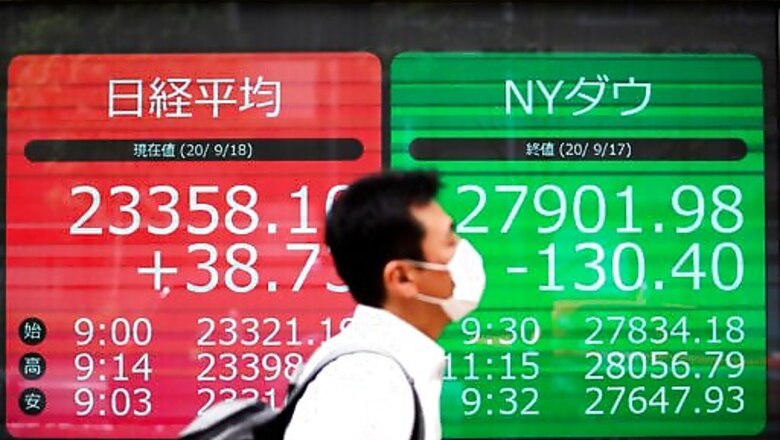
views
NEW YORK: Stocks are falling in afternoon trading on Wall Street Friday, as another zig-zag week for markets closes out following their abrupt loss of momentum this month.
The S&P 500 was down 1% and is on pace for its third straight weekly loss.
The Dow Jones Industrial Average fell 150 points, or 0.5%, to 27,759, as of 12:43 p.m. Eastern time, and the Nasdaq composite fell 1.7% after initially eking out a gain earlier in the day. Smaller stocks also fell, with the Russell 2000 index of small caps down 0.7%.
Analysts warned that the days trading could be even bumpier than usual. Futures and options on stocks and indexes are set to expire in an event known as quadruple witching, which can drive swings in prices.
Stocks have already swirled this week despite the Federal Reserves saying it expects to keep short-term interest rates at record lows through 2023. Low rates typically turbocharge the market by encouraging investors to pay higher prices for stocks, but some investors may have been looking for the Fed to be even more aggressive.
Growth in some areas of the economy has also slowed after unemployment benefits and other aid from the federal government expired, and partisan disagreements in Congress are holding up a possible renewal of support. Investors say its essential that such aid arrives.
To the extent that you dont get an additional fiscal cushion, the economy is going to be impacted by it, said Brian Levitt, global market strategist at Invesco.
Rising tensions between the worlds two largest economies are also continuing to keep markets on edge. The United States said on Friday that it will ban the downloads of the Chinese apps TikTok and WeChat on Sunday. It cited national security and data privacy concerns.
President Donald Trumps targeting of the Chinese tech industry has caused intermittent worries in the market about a possible retaliation against the U.S. industry.
Big Tech stocks already stumbled sharply this month on worries that their prices have grown too expensive following their virtuosic performance through the pandemic. Surging shares of Apple, Microsoft, Amazon and others helped carry Wall Street back to record heights, even as the pandemic walloped much of the economy, as the coronavirus accelerated work-from-home and other trends that benefit them.
But they suddenly lost momentum two weeks ago, causing the market to swing with them. Because these companies have grown so massive, their stock movements have huge sway over broad market indexes, such as the S&P 500.
We certainly got a little short-term overbought and we headed into a time of the year that is not great for markets, Levitt said.
On Friday, several Big Tech stocks continued slipping. Apple was down 3.2%, and Microsoft was down 2.4%, but Facebook was up 1%.
Also on the long list of concerns for markets is how the pandemic progresses, whether a vaccine for COVID-19 could indeed be available in early 2021 as many investors expect and what Novembers U.S. presidential election will do to the economy.
Treasury yields remain very low, showing the powerful strength of the Federal Reserve and continued expectations by bond investors for only modest economic growth and inflation. The yield on the 10-year Treasury remained at 0.69% from late Thursday.
A preliminary report on Friday said that consumer sentiment is improving at a faster pace than economists expected, which is key for an economy where spending by consumers is the main driver. But it follows other reports this week that showed growth in retail sales slowed last month and the number of layoffs across the country remains stubbornly high.
Other stock markets around the world made mostly modest moves.
In Europe, the German DAX lost 0.7%, and the French CAC 40 sank 1.2%. The FTSE 100 in London fell 1.1%.
Asian markets rose. Japans Nikkei 225 added 0.2%, South Koreas Kospi gained 0.3% and Hong Kongs Hang Seng climbed 0.5%. Stocks in Shanghai rose 2.1%.
Benchmark U.S. crude oil rose 0.2% to $41.06 to per barrel. Brent crude, the international standard, fell 0.3% to $43.14 per barrel.
___
AP Business Writer Yuri Kageyama contributed.
Disclaimer: This post has been auto-published from an agency feed without any modifications to the text and has not been reviewed by an editor
















Comments
0 comment